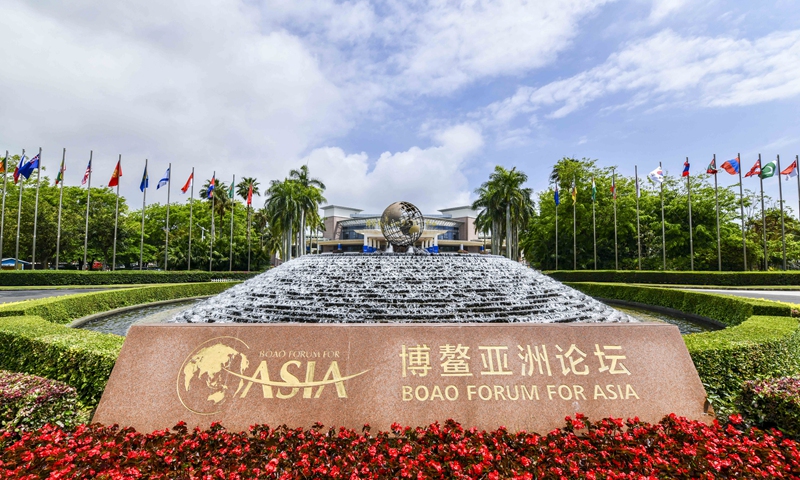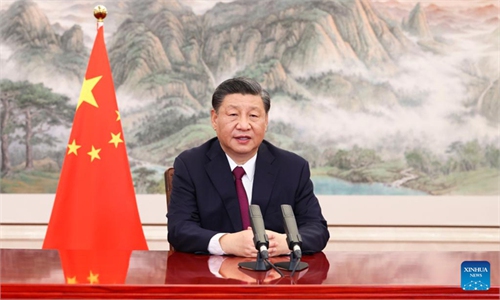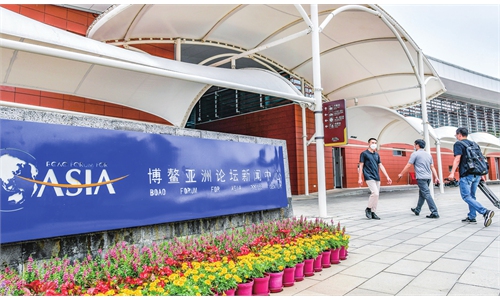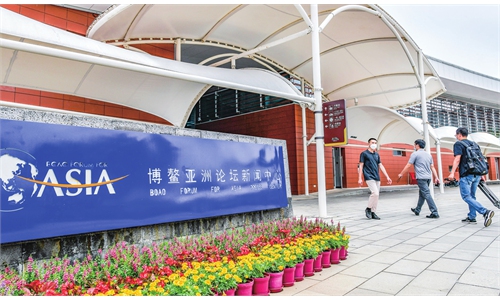Multilateralism, regional integration will ease supply chain problems: Boao Forum
Boao forum calls for openness, macro policy coordination

Photo shows the fountain square in front of the permanent site of the Boao Forum for Asia (BFA) in Boao, South China's Hainan Province, on April 19, 2022. Photo: cnsphoto
The ongoing global supply chain crisis should be tackled by the major economies leading by example through multilateral consultation, economists and delegates attending the Boao Forum for Asia 2022 said.
Global supply chains were a highlight at the BFA 2022, as many companies have been rethinking their supply chain layouts with the fragility of existing supply chains exposed amid the global pandemic, geopolitical tensions and challenges from climate change. Some countries, such as the US, have acted to politicize and even weaponize the supply chain issue.
The discussion also comes as the epidemic situation in China's economic hub Shanghai has caused the production of many companies, including big names such as Tesla and SAIC Motor, to come to a temporary halt.
World Bank President David Malpass on Wednesday said he expects a "strong effort" by some economies in the world to reduce their dependence on Russia for energy supplies, and China for supply chains, citing overdependence.
Delegates attending the forum said that the higher level of regional integration in Asia stands as a safeguard amid the current supply chain reshuffle, because as companies choose to shorten their supply chains, they will tend to keep their supply chains in Asia.
The Regional Comprehensive Economic Partnership, which officially came into effect early this year and stands to boost regional trade and investment, is another positive factor.
Speaking at the BFA via a video link on Thursday, Chinese President Xi Jinping urged countries to stay committed to building an open world economy, increasing macro policy coordination, and keeping global industry and supply chains stable.
Leon Wang, executive vice president of global drug-maker AstraZeneca, told the Global Times on Thursday at the BFA that the resilient supply chain in China and its Chinese partners ensured stable production of AstraZeneca COVID-19 vaccines supplied to the world.
As of the end of March, over 2.8 billion doses of COVID-19 vaccines were supplied to more than 180 countries worldwide, about two-thirds of which were exported to low-income countries and regions.
The active vaccine ingredients manufactured by WuXi Biologics, one of its major suppliers of vaccines, accounts for approximately 50 percent of the company's COVAX vaccine supply.
The Asian economy, which accounts for nearly half of the world's economy on a purchasing power parity basis, is projected to grow 4.8 percent in 2022, according to a report published during the Boao Forum for Asia 2022.
The speed of integration among Asian economies has been sustained and even accelerated in some areas despite the COVID-19 pandemic, US interference and other challenges, the report said.
Xu Sitao, chief economist of Deloitte China, told the Global Times that the difficult economic situation, featuring rising inflationary pressure and stagflation risks in many countries, has actually exacerbated and consolidated the momentum of trade integration in the Asian region, in a way that acted as a hedge against the impact of surging inflation.
For supply chain security, Xu said a country can either choose to produce all products it needs, becoming very safe and at the same time very poor, or to remain committed to fully engaging with the world, but in the process taking care to put eggs in different baskets and hedging risks with diversification.
Caution should be applied in balancing supply chain security and efficiency, Xu said, warning policymakers not to go to extremes.
And, the fallout of the Russia-Ukraine conflict on global supply chains is still unfolding.
German Foreign Minister Annalena Baerbock announced that Germany will stop importing oil from Russia at the end of the year after a meeting with her Baltic counterparts on Wednesday.
Alessandro Golombiewski Teixeira, former chief economic advisor to the president of Brazil, told the Global Times on Thursday that the global supply chain crisis is a complex issue involving war, food and an energy crisis, and attempts by the US to crack down on China in the technology sphere.
The world needs the UN system, as well as other multilateral platforms such as the G20, as venues to alleviate the global supply chain crisis, Teixeira said, noting that big countries should lead by example and not care for their own interests.
The IMF this week slashed its forecast for global economic growth for 2022 by 0.8 percentage points from its January forecast to 3.6 percent, citing the shock waves from the Russia-Ukraine conflict.




